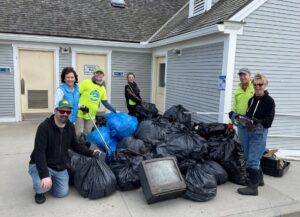 HYANNIS – The Hollywood movie, Step Brothers, has a scene where two adult stepbrothers are sleepwalking one night and raising havoc in the kitchen. They unknowingly raid the cabinets, empty the refrigerator, toss dishes and create an overall mess.
HYANNIS – The Hollywood movie, Step Brothers, has a scene where two adult stepbrothers are sleepwalking one night and raising havoc in the kitchen. They unknowingly raid the cabinets, empty the refrigerator, toss dishes and create an overall mess.
The next morning, the mother finds her purse in the freezer and the couch pillows in the oven, all clues to the pair’s escapade.
Is this an accurate depiction of sleepwalking or can someone with this condition actually create such chaos without remembering it?
In the most extreme cases, it is possible, according to Giannina Tierney MD, a Falmouth pediatrician.
“It’s not an uncommon event, although it is scary to the parent,” she said. “It may happen once or twice a month and can be triggered by sleep deprivation or fever.”
What Is Sleepwalking?
Sleepwalking (somnambulism) is a sleep disorder mostly found in children. Approximately 15 percent of children between the ages of six and 16 sleepwalk, according to the American Academy of Pediatrics (AAP).
Nighttime strolls usually occur within two to three hours of falling asleep, typically during the non-REM (non-rapid eye movements), or deepest cycle of sleep.
The child may sit up in bed with eyes wide open and not say a word. Or they may hop out of bed and wander around the house, sometimes entering closets, raiding the refrigerator or getting dressed to go outside.
They appear awake and yet they are asleep.
The first time it happened in my home, I was awakened by my 8-year-old daughter calling for me. I found my six-year-old son standing at the foot of her bed, not saying a word and staring.
When I attempted to direct him to his room he went into the hall closet. There was no reasoning with him. A few minutes later, he went back to his bed, slept the rest of the night and didn’t remember one bit of it the next morning.
To help prevent sleepwalking, Dr. Tierney recommends developing good sleep habits, such as no electronics or television in your child’s bedroom and creating some downtime before bed.
“Children under the age of six should be getting 10 to 12 hours of sleep and older children, eight to 10 hours,” said Dr. Tierney.
What Can Be Done
If your child sleepwalks, you can keep the environment safe by:
- Keeping doors and windows locked at night
- Making sure your child does not sleep in a top bunk of a bunk bed
- Keeping sharp, breakable or dangerous items out of the bedroom
- Placing a safety gate at your child’s bedroom door or top of the stairs
- Keeping the floor free of clutter and objects to prevent falls
Another harmless but frightening event occurring, mostly in toddlers and preschoolers, are night terrors. Children who experience them are in their deepest sleep when all of sudden they display behaviors right out of a horror story. According to the AAP, a child experiencing night terrors may:
- Cry uncontrollably
- Sweat, shake or breathe fast
- Have a terrified, confused, or glassy-eyed look
- Thrash around, scream, kick, or stare
- Not recognize you or realize you are there
- Try to push you away, especially if you try to hold him
The best response is to keep calm, don’t try to awaken your child, and make sure they can’t hurt themselves, according to Dr. Tierney. If he or she tries to get out of bed, gently restrain him or her, and after a short time, your child will more than likely relax and sleep quietly.
Like sleepwalking events, your child won’t remember having a night terror in the morning.
Nightmares are another nighttime occurrence where your child wakes after a scary dream. They recognize you and are able to tell you about the dream, even though they may be frightened. Once the child is calm, you can encourage them to go back to sleep.
If sleepwalking and or night terrors occur more than once or twice a month, Dr. Tierney recommends parents consult with their pediatrician and keep a sleep journal. Documentation of the events will help them to decide if testing is needed to look for an underlying cause.























